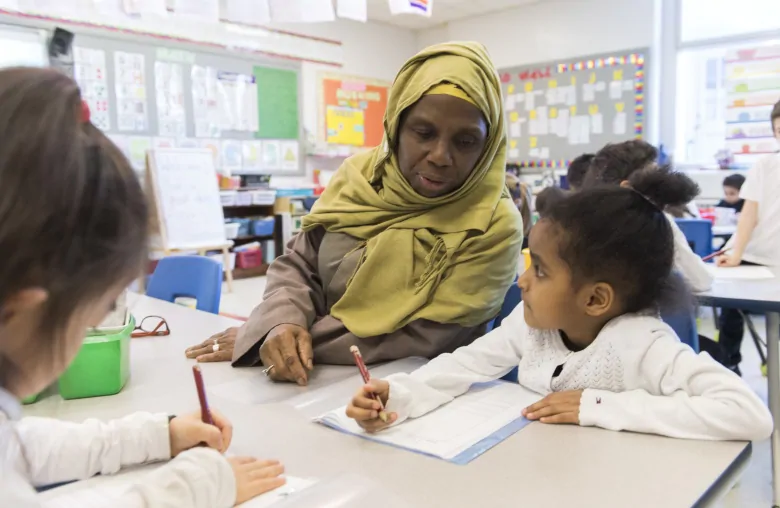Kids don't trust Alexa to give the right answer

Picture this: You’re playing a game of trivia with friends. The question is, “How many bones are in the human hand?”
Your friend answers 27.
You decide to ask Alexa, the smart speaker sitting in the living room, to verify the number. Alexa says, “26.”
Everyone agrees that even though your friend’s guess was close, their answer was in fact, wrong. No point for them.
But who was actually right? Would you take what Alexa says as fact?
According to a new study, it depends on who you ask. While adults might be willing to take those results as fact, kids are a bit more skeptical.
In a study entitled Who Do I Believe?: Children’s Epistemic Trust in Internet, Teacher and Peer Informants, published recently in the Journal of Cognitive Development, five- to eight-year-old Chinese children were asked questions about scientific or historical facts, such as how many bones are in the human hand or “How many days does it take Mars to finish a single orbit?”
The researchers then offered contrasting responses to these kids. While the internet said it would take 600 days for Mars to revolve around the sun, their teacher said 700. (The real answer, by the way, happens to be 687 days.)
What the researchers found is that the kids overwhelmingly trusted the teacher over the virtual entity — even if the teacher was wrong.
‘Kids trust their teachers’
According to experts, this can be relatively easily explained.
“Kids trust their teachers because they’ve learned to trust them, whereas they’re still figuring out whether or not sources like voice assistants are trustworthy,” said Matthew Johnson, director of education for the media literacy advocacy organization Media Smarts.
Johnson said his group’s own research, the Young Canadians in a Wired World study, backs up the new findings. “Children see teachers as being just as important a source of information and guidance in our age of information overload as they did when information was scarce.”
The Media Smarts study tracked the behaviours, attitudes and opinions of Canadian children and youth with respect to their internet use.
Johnson pointed out that turning to a teacher for help was one of the top strategies reported by young people when it came both to finding and verifying online information.
According to Judith Danovitch, a professor of psychological and brain sciences at the University of Louisville and one of the researchers in the Who Do I Believe? study, the disembodied nature of the internet – and voice assistants such as Alexa – can be confusing for young kids.
Is it a person? Where does this information come from? Trusting another human, on the other hand, is hardwired into our brains.
What’s more, it doesn’t seem to be the authority of the teacher that makes them trustworthy. According to the study, kids tended to trust what their peers said over the internet’s results, even though they knew their friends’ knowledge was approximate to their own.
Growing trust of technology
So, at what age do we start trusting the internet, and machines, more?
“Until at least age eight or so, children are largely cautious when it comes to trusting the internet over a human source,” said Danovitch. But it seems that as they learn more about computers, their relationship with them changes.
Johnson said that kids in their early teens “become able to reconcile the contradictory qualities of interactive technology.” In other words, they come to recognize that computers are prone to silly mistakes (like humans) while also having a sometimes dangerous misconception that they are superhuman, and perfectly accurate, unbiased and morally neutral.

Given the viral spread of misinformation from fabricated “news” stories and deepfake videos, you can see why adults trust what they see and read online perhaps more than they should.
Danovitch’s study also looked at adults’ trust of the internet, and found there were substantial differences in how children and grown-ups treated information from the internet.
Danovitch and her colleagues found that when the statements involved scientific and historical facts, kids tended to trust the teacher while adults were more inclined to trust the internet. The researchers concluded this could be due to the vast amounts of information available online, the fallibility of human memory and the tendency for adults to become less trusting of humans as they get older.
Still, the extent to which individuals trust computers ultimately depends on the task at hand, said Danovitch. “Adults may trust machines more than a person to solve a complex mathematical equation, but they do not necessarily trust a computer to make a subjective judgment, and the same is true for children.”
What’s clear is that the question of who — or what — we trust most is coming up earlier in our lives, as kids use digital technology at younger ages, first with touch screens and then voice-controlled tech like Alexa and Siri, said Johnson.
While adults often underestimate kids’ ability to evaluate information sources, he said “children are actually quite capable of determining whether an information source is trustworthy” — no doubt an increasingly relevant skill, no matter your age.





